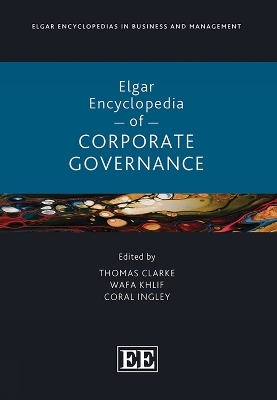
Elgar Encyclopedia of Corporate Governance
Edward Elgar Publishing Ltd (Verlag)
978-1-83910-705-4 (ISBN)
Bringing together almost 100 leading experts, the Encyclopedia addresses the meaning and purpose of corporate governance and how this term has evolved over time. Philosophical perspectives on corporate governance, as well as its origins and history are laid out, alongside critical theories and methodologies on governance. The Encyclopedia then examines different aspects of governance related to governance regimes, neoliberalism, finance, accounting and corporate reporting, law and regulation, strategy and forms of governance. Board processes and performance, leadership in the boardroom, board directors and board diversity are explained. Focus is drawn to emerging societal problems and crises related to corporate governance and how these have been addressed by different institutions, such as digital era governance, corporate social responsibility and corporate sustainability and regeneration of the natural world.
The Elgar Encyclopedia of Corporate Governance is an essential reference source for academics, researchers and students of business and management, economics and finance and environmental studies. Professionals and policymakers working in the sectors of corporate governance, corporate social responsibility, management and sustainability and strategic management will also find this to be an indispensable reference work.
Key Features:
163 distinct entries structured by theme
Combines empirical findings with real-world examples
Adopts a comparative global analysis from leading academics
Accessible explanations of fundamental concepts and principles
Edited by Thomas Clarke, UTS Business School, University of Technology, Sydney, Australia, Wafa Khlif, TBS Business School, Barcelona, Spain and Coral Ingley, Faculty of Business and Law, Auckland University of Technology, New Zealand
Contents
Introduction to the Elgar
Encyclopedia of Corporate Governance 1
Thomas Clarke, Wafa Khlif,
Coral Ingley
PART 1 PHILOSOPHICAL
PERSPECTIVES ON
CORPORATE GOVERNANCE
1 Adam Smith: moral sentiments 12
Thomas Clarke
2 Karl Marx: the labour
theory of value and exploitation 15
Thomas Clarke
3 John Stuart Mill:
utilitarianism and the
economic conditions of happiness 18
Thomas Clarke
4 Do private vices bring
public benefit? Mandeville
and the foundations of
modern capitalism 20
Wafa Khlif
5 Capitalism and Deleuze 22
Finn Janning
6 Resisting the
financialization of corporate
governance with Deleuze
and Guattari 23
Charles Barthold
7 Enriqué Dussel’s
philosophy of liberation:
moving beyond colonial
Eurocentrism 25
Wafa Khlif
PART 2 ORIGINS AND HISTORY OF
CORPORATE GOVERNANCE
8 Corporate governance 28
Yuri Biondi
9 The genesis of the
corporation: The 17th- and
18th-century East India Companies 30
Thomas Clarke
10 Berle and Means and the
modern corporation as
a new public institution
(1850s–1930s) 33
Olivier Weinstein
11 The evolution of corporate
governance 35
Bob Tricker
12 Managerial capitalism
(1940s–1970s) 38
Olivier Weinstein
13 The countervailing power
of the New Deal, and the
rise of the financialised
corporation and neo-liberalism 41
John Cioffi
14 The new contractual
economic theory of the firm
(1970s–2010s) 45
Olivier Weinstein
15 The displacement of
managerial capitalism by
financial capitalism (2010s–2020s) 48
Olivier Weinstein
PART 3 CHALLENGING
NEO-LIBERALISM
16 Neoliberal resilience 52
Abby Innes
17 The financialisation of
corporate governance 54
Thomas Clarke
18 Challenging neoliberalism
in the face of global complexity 57
Wafa Khlif, Thomas Clarke, Lotfi
Karoui, Konan A. Seny Kan,
Coral Ingley
PART 4 CRITICAL THEORIES AND
METHODOLOGIES
19 Shareholder primacy and
long-term corporate investment 60
Lynn Stout
20 The myths of shareholder primacy 63
Thomas Clarke
21 Social approaches to
corporate governance 66
Thomas Donaldson
22 Team production theory of
corporate law 68
Margaret M. Blair
23 Extended team production theory 69
Morten Huse
24 Stakeholder theory 70
Thomas Clarke
25 A critique of stakeholder theory 73
Charles Blattberg, Dylan Scudder
26 Behavioural theory of
boards and governance 74
Morten Huse
27 Multi-level corporate governance 75
Konan A. Seny Kan
28 Resource dependence
theory: a political
understanding of corporate
governance 77
Werner Nienhüser
29 Sustainability and corporate
governance 78
Jeroen Veldman
30 Methodological
perspectives in corporate
governance 80
Konan A. Seny Kan, Wafa Khlif,
Coral Ingley, Lotfi Karoui
31 Integrating theoretical
perspectives on corporate
governance 82
Lotfi Karoui, Coral Ingley, Wafa Khlif
PART 5 GOVERNANCE REGIMES
32 Anglo-American corporate
governance 85
Thomas Clarke
33 European corporate
governance:
relationship-based approaches 91
Thomas Clarke
34 Asia-Pacific
corporate governance:
family-controlled business networks 95
Thomas Clarke
35 Corporate governance in Italy 100
Alessandro Zattoni
36 Corporate governance in
Central and Eastern Europe
between 1945 and 1990 101
Rainhart Lang, Miklos Dobak,
Thomas Steger
37 Corporate governance in
Central and Eastern Europe
after 1990 103
Thomas Steger, Rainhart Lang,
Miklos Dobak
38 Neopatrimonial (corporate)
governance 105
Danson Kimani, Teerooven
Soobaroyen
39 Director independence in
developed and developing
economies 107
Coral Ingley
40 Structural information
asymmetry, local
institutions and corporate
governance in Africa 113
Charles C. Okeahalam
41 Corporate governance
and boards in Africa: the
Ubuntu model? 115
Emmanuel Adegbite, Folajimi Ashiru
PART 6 FINANCE AND CORPORATE
GOVERNANCE
42 Ownership and corporate
governance 118
Ludo Van der Heyden
43 Corporate governance and
finance: investment funds 120
Coral Ingley
44 The global growth of equity
markets 125
Thomas Clarke
45 Investor voting and
shareholder rights 128
Coral Ingley
46 Insider trading 133
Marc Goergen
47 Pyramidal groups 134
Alessandro Zattoni
48 Corporate governance and
finance aspects: dividend
policy, bond yields, and risk-taking 135
Coral Ingley
49 Dividend policy 139
Marc Goergen
50 The international premium
for corporate governance 140
Thomas Clarke
51 Investors as stewards:
a sustainable symbiosis? 143
Hans van Ees, Niels Hermes
52 Purpose and paradigm shifts
in banking governance 145
Nihel Chabrak, María Luisa Pajuelo
PART 7 ACCOUNTING AND
CORPORATE REPORTING
53 Creative accounting, fraud,
and international accounting
scandals 148
Michael J. Jones
54 Accounting for inequality 149
Prem Sikka
55 The OECD/G20 agreement
on minimum corporate
taxation: scope for fairness
or financialisation? 153
Yuri Biondi
56 Waves of international
frameworks for
sustainability reporting 155
David Monciardini, Jukka Tapio
Mähönen, Georgina Tsagas
57 Integrity in disclosure and
accountability 160
Nihel Chabrak, María Luisa Pajuelo
58 ESG: overview and critique 162
Coral Ingley
59 ESG: reporting and greenwashing 166
Coral Ingley
60 Transparency in corporate
governance and ethical conduct 171
Coral Ingley
61 Voluntary environmental
disclosure in an
authoritarian political context 175
Coral Ingley, Wafa Khlif
PART 8 LAW AND REGULATION
62 The dimensions of corporate
personality 180
Lynn Stout
63 Corporate moral personhood 182
Matthew Lampert
64 Enterprise 184
Blanche Segrestin, Kevin Levillain
65 Fiduciary duty 186
Thomas Clarke
66 Corporate governance deviance 189
Ruth V. Aguilera, Siri Terjesen
67 Contractual corporate governance 190
Marc Goergen
68 Codes of good governance 191
Alessandro Zattoni
69 Stewardship codes and
investor stewardship 192
Alice Klettner
70 Questioning CEO-Chair
separation: a critical review
and integrative model 193
Wafa Khlif, Sami El Omari,
Konan A. Seny Kan
71 (Convergence of) legal
corporate perspectives 195
Véronique Magnier
72 The globalisation of regulation 197
Thomas Clarke
73 Revisiting regulatory frameworks 201
Coral Ingley, Lotfi Karoui, Wafa Khlif
74 A new global regulatory
architecture for corporate
governance? 202
Thomas Clarke
PART 9 STRATEGY AND
CORPORATE GOVERNANCE
75 Corporate governance life cycle 206
Igor Filatotchev, Steven Toms
76 Corporate governance and M&As 207
Xavier Castañer
77 Strategic leadership by the board 210
Ljiljana Erakovic
78 Boards and strategy 211
Alessandro Zattoni
79 Value and value creation in
corporate governance 212
Daniel Yar Hamidi
80 Ambidexterity 214
Morten Huse
81 Corporate governance,
boards, and innovation:
reviews of literature 215
Coral Ingley
82 Organizational legitimacy 219
Martijn Boersma
83 Board strategic balance:
a practical theory of sport
governance 220
Lesley Ferkins, David Shilbury
PART 10 FORMS OF GOVERNANCE
84 Meta-organizations:
evolving forms of governance 223
Héloïse Berkowitz
85 Entrepreneurial threshold firms 224
Jonas Gabrielsson
86 Corporate governance: the
case of the Mondragon
Cooperative Group 226
Hervé Grellier-Bidalun, Jean
Francois Chanlat
87 Corporate governance in IPOs 228
Alessandro Zattoni
88 Value and value creation
perspectives from research
and practice in SMEs 229
Coral Ingley
89 Complexity and power
dynamics in governing family firms 231
Coral Ingley, Wafa Khlif
90 Family firms and board
composition – complexity,
ownership, and succession 234
Wafa Khlif, Coral Ingley
91 Corporate governance
within and by the media 237
Nathalie Fenton
92 Whistleblowing 238
Eva Tsahuridu
PART 11 BOARD PROCESSES AND
PERFORMANCE
93 The board of statutory auditors 240
Lino Cinquini, Andrea Melis
94 Board roles 242
Pieter-Jan Bezemer
95 Theorising director task
performance 243
Stuart Farquhar
96 Board role performance:
opening the black box of
board activation process 245
Lotfi Karoui
97 Board processes 247
Alessandro Zattoni
98 Board remuneration 248
Coral Ingley
99 Evolving perspectives on
board governance and innovation 251
Coral Ingley
100 Board capital 254
Morten Huse
PART 12 LEADERSHIP IN THE
BOARDROOM
101 Board team leadership 256
Ljiljana Erakovic
102 Board dynamics 257
Philip Stiles
103 The chair’s leadership of the board 258
Ljiljana Erakovic
104 The continual rapid inflation
in CEO pay in the United States 259
Thomas Clarke
105 Functional stupidity in the
boardroom? 264
Martin Blom, Mats Alvesson
PART 13 BOARD DIRECTORS
106 Business elites 266
Sibel Yamak
107 Board reforms 268
Marta A. Geletkanycz
108 Director independence 269
Coral Ingley
109 Directors’ fiduciary duty
and perspectives on sustainability 273
Coral Ingley
110 Digital skills of
non-executive directors 278
Michele Phillips
PART 14 DIVERSITY AND BOARD
111 Diversity, equity and inclusion 281
Thomas Clarke
112 Diversity on boards 286
Patricia Gabaldon
113 Women on boards: targets
and quotas 288
Ruth Sealy, Susan Vinnicombe
114 Women on boards – shifting
board behaviours 290
Ruth Sealy
115 Golden skirts 292
Morten Huse
116 Polish women on boards 293
Agnieszka Slomka Golebiowska
PART 15 GLOBALISATION AND
INSTITUTIONS OF
GOVERNANCE
117 The meaning of globalization 295
Thomas Clarke
118 The deregulation of finance
and the globalization of
capital markets 297
Thomas Clarke
119 Globalization and
deglobalization of corporate
governance 300
Thomas Clarke
120 Globalization from below 304
Wafa Khlif
PART 16 CRISES IN GOVERNANCE
121 Crisis and reform in
corporate governance 307
Thomas Clarke
122 The Wall Street crash 1929 309
Thomas Clarke
123 The Asian financial crisis 1997 311
Thomas Clarke
124 NASDAQ/Dot.com crash 314
Thomas Clarke
125 The global financial crisis
2007/2008 317
Thomas Clarke
126 The universal and pervasive
impact of financialization 320
Thomas Clarke
127 Why has the COVID-19
pandemic questioned
corporate governance? 322
Yvon Pesqueux
128 Beyond economics:
revisiting governance crises
with Ibn Khaldun 323
Wafa Khlif, Lotfi Karoui
PART 17 CORPORATE GOVERNANCE
AND SOCIETY
129 From government to governance 327
Antonino Palumbo
130 Purpose-driven corporation 329
Blanche Segrestin, Kevin Levillain
131 Conceiving the purpose of
the company 331
Thomas Clarke
132 The social licence to operate 335
Thomas Clarke
133 “Good governance” in the
face of cultural differences 337
Hèla Yousfi
134 Innovation, growth and productivity 339
Thomas Clarke
135 Trust, trustworthiness and
corporate governance 342
Nikolas Kirby
136 Gender board quotas and
sustainable development 343
Morten Huse
137 Human rights 344
Justine Nolan
138 Modern slavery 346
Martijn Boersma
PART 18 DIGITAL ERA GOVERNANCE
139 Digital transformation and
governance 349
Thomas Clarke
140 Surveillance 353
Afshin Mehrpouya
141 Digital disruption and governance 355
Thomas Clarke
142 Smart governance 359
Yvon Pesqueux
143 Critique of digital disruption 361
Thomas Clarke
144 The governance of cyber security 364
Thomas Clarke
PART 19 CORPORATE SOCIAL
RESPONSIBILITY
145 Corporate social
responsibility and
environmental and social
governance 369
Thomas Clarke
146 Doing the “right” thing:
ethical behaviour and
sustainable value creating business 373
Coral Ingley
147 The potential for
interlocking directorships to
influence sustainability practices 376
Coral Ingley
148 Corporate tax avoidance 380
Thomas Clarke
PART 20 CORPORATE
SUSTAINABILITY
149 Corporate governance of
sustainability 386
Wafa Khlif, Lotfi Karoui, Coral Ingley
150 The governance of sustainability 389
Bobby Banerjee
151 Governing for sustainability 390
Coral Ingley
152 The sustainability value curve 393
Thomas Clarke
153 Corporate governance and
sustainable value creation 396
Beate Sjåfjell
154 Corporate climate champions 397
Jasper Finkeldey
155 Corporate greenwashing 399
Thomas Clarke
PART 21 REGENERATION OF THE
NATURAL WORLD
156 The central role of
environmental justice in
corporate governance 403
Marcel Llavero-Pasquina, Joan
Martínez-Alier
157 Natural capital 406
Coral Ingley
158 Extinction accounting 409
Jill Atkins
159 Accounting care 411
Jacques Richard
160 Accounting for biodiversity 412
Mike Jones
161 Systemic sustainability in
governance 414
Wafa Khlif, Lotfi Karoui, Coral Ingley
162 Innovation for sustainability 416
Thomas Clarke
163 Regeneration of natural capital 419
Thomas Clarke
| Erscheinungsdatum | 01.11.2024 |
|---|---|
| Reihe/Serie | Elgar Encyclopedias in Business and Management series |
| Verlagsort | Cheltenham |
| Sprache | englisch |
| Maße | 169 x 244 mm |
| Themenwelt | Schulbuch / Wörterbuch ► Lexikon / Chroniken |
| Wirtschaft ► Betriebswirtschaft / Management ► Finanzierung | |
| Wirtschaft ► Betriebswirtschaft / Management ► Unternehmensführung / Management | |
| ISBN-10 | 1-83910-705-7 / 1839107057 |
| ISBN-13 | 978-1-83910-705-4 / 9781839107054 |
| Zustand | Neuware |
| Haben Sie eine Frage zum Produkt? |
aus dem Bereich


